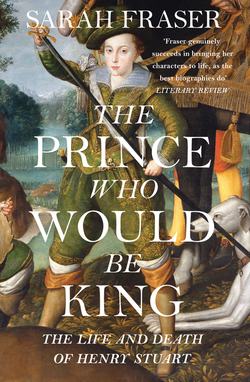Читать книгу The Prince Who Would Be King: The Life and Death of Henry Stuart - Sarah Fraser, Sarah Fraser - Страница 17
ОглавлениеFOUR
Nursery to Schoolroom
‘THE KING’S GIFT’
By 1599 James had shooed ‘the skirts’ out of Prince Henry’s lodgings and ordered diverse men of ‘good sort to attend upon his person’ instead. It was time to prepare the boy to be king.
James produced a hands-on guide to kingcraft for this purpose. You must ‘study to know well [your] own craft … which is to rule [your] people’, he told his five-year-old son. The king had been writing and thinking about this for a long time. His Basilikon Doron (‘The King’s Gift’) came out that year in a tiny print-run of seven. Copies of ‘His Majesty’s instructions to his dearest son, Henry the Prince’ went to a privileged few: Prince Henry, the queen, Mar, and the man James appointed to be Henry’s tutor, Adam Newton.
Self-help guides in preparation to rule were an established genre. The most famous, still in use at this time, was Erasmus’s Institutio Principis Christiani (‘The Education of a Christian Prince’, 1516). James VI’s book possessed a special allure, though, being written by a ruling personal monarch with vast experience of the subject.
He divided Basilikon Doron into ‘three books: the first instructing the prince on his duty towards God; the second in his duty when he should be king; and the third informing him how to behave himself in indifferent things, which were neither right nor wrong, but according as they were rightly or wrong used’. James’s writing voice enlivened the content. He could be intimate, colloquial, shrewd and humorous, but also deeply learned. When it came to publishing the book for a wider readership, in England in 1603, James revised it, allowing his subjects to see how the wise philosopher-king was nurturing the student prince for them.
God expected Henry to have a detailed knowledge of scripture, his father told him, in order to ‘contain your Church in their calling’. In James’s view, the clergy’s role was only to be custodians of his church, subservient to the king’s wishes. Henry must not let ministers overstep this mark, interfere in government, or try to limit the authority of the king. Henry should strive to cultivate a middle path in matters of faith: ‘Beware with both the extremities; as well as ye repress the vain Puritan, so [also] not to suffer proud Papall Bishops.’ The king had already experienced memorable run-ins with certain Calvinist ministers who treated the heavenly and worldly realms as distinct. In general, Henry should be ‘a loving nourish-father’ to his church, said James, echoing Isaiah 49:23, where ‘Kings shall be thy nursing fathers’.
A poet, philosopher and one of the most intelligent rulers in Christendom, James wanted his son to be as scholarly as him. In matters of secular government, Henry must ‘study well your own laws’, and recommended as further reading Xenophon and Caesar on statecraft. Henry’s tutors agreed, but had their own preferred exemplars; in time they would expose the prince to them, to the king’s displeasure.
James encouraged Henry to study mathematics, which would allow him to fulfil the prime function of monarchy: the management of national security and foreign policy – or, when and how to make war. For this, maths would improve his mastery of ‘the art military, in situations of Camps, ordering of battles, making fortifications, and the placing of batteries’. A good commander could calculate the range and elevation for firing artillery and placing of infantry, and understand engineering issues such as where to mine walls for maximum destruction.
Although Basilikon Doron was a practical manual on kingcraft, James touched on the theory of monarchy, as expanded upon in his recent long essay: The True Lawe of Free Monarchies. The king nuanced the Calvinist theory of predestination when he told Henry there was nothing you could do to earn the right to rule; God’s will destined Henry to be king. Kings preceded the creation of all councils, including parliaments and church. Thus, on every count the king’s power was pre-eminent.
This was the voice of a personal and absolute monarch speaking: one in whom supreme power rested, without any necessity to work through parliaments or councils. King Henry IX will be a type of ‘little god’, said James, adapting Psalm 82:6: ‘I have said, ye are gods’, there to exercise imperial power. Nonetheless he must earn his subjects’ respect – as ‘the highest bench is the sliddriest to sit upon’.
Lofty and earthy, this was a classic Jamesian image of kingship, congruent with his True Lawe of Free Monarchies (subtitled The reciprock and mutuall dutie betwixt a free King, and his natural Subiectes), in which James made an apology for the theory of the divine right of kings and absolutism, the monarch’s ‘imperium’. Since they were quasi-divine beings, said James, kings could not be punished by subjects if they were weak or wicked.
In the last resort, a monarch was ‘free’ to do as he liked. Only God could tip monarchs off the ‘sliddriest’ bench into the abyss if they failed to rule well. A king’s duty was more onus than honour. His first duty was to be a good ruler. If Henry kept that in mind, he would avoid the loathing of God and men.
